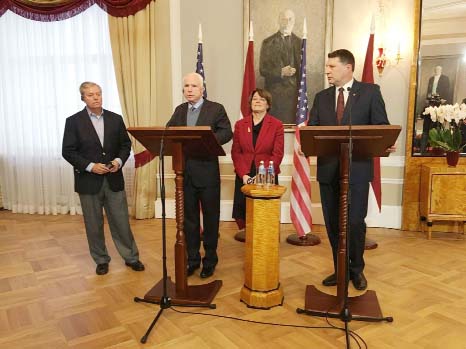
Reuters, Washington :
The Obama administration plans to announce on Thursday a series of retaliatory measures against Russia for hacking into U.S. political institutions and individuals and leaking information in an effort to help President-elect Donald Trump and other Republican candidates, two U.S. officials said on Wednesday.
Both officials declined to specify what actions President Barack Obama has approved, but said targeted economic sanctions, indictments, leaking information to embarrass Russian officials or oligarchs, and restrictions on Russian diplomats in the United States are among steps that have been discussed.
One decision that has been made, they said, speaking on the condition of anonymity, is to avoid any moves that exceed the Russian election hacking and risk an escalating cyber conflict that could spiral out of control. One example of an excessive step might be interfering with Russian internet messaging.
The Federal Bureau of Investigation, Central Intelligence Agency and Office of Director of National Intelligence agree that Russia was behind hacks into Democratic Party organizations and operatives ahead of the Nov. 8 presidential election. There is also agreement, according to U.S. officials, that Russia sought to intervene in the election to help Trump, a Republican, defeat Democrat Hillary Clinton.
Russia has repeatedly denied hacking accusations. Trump has dismissed the assessments of the U.S. intelligence community.
Obama, in an interview earlier this month with NPR, said, “We need to take action and we will” against Russia for interfering in the U.S. election. Trump seemed to suggest the United States should not impose sanctions on Russia.
“I think we ought to get on with our lives,” Trump told reporters in Florida on Wednesday when asked about remarks by Republican Senator Lindsey Graham, who said Russia and President Vladimir Putin should expect tough sanctions for the cyber attacks.
Russia’s Foreign Ministry spokeswoman, Maria Zakharova, promised retaliation on Wednesday against Washington in the event of new economic sanctions.
Jim Lewis, a cyber security expert with the Center for Strategic and International Studies think tank, said further sanctions may be an effective U.S. tool in part because they would be difficult for Trump to roll back and because Russia “hates” dealing with them.
Meanwhile, U.S. senators visiting eastern European allies to discuss security issues called for sanctions against Russia for interfering in the presidential election by hacking American political sites and email accounts. Their demands came amid ongoing discussions among U.S. officials on an imminent response to alleged Russian meddling that would ensure the U.S. takes action before President-elect Donald Trump takes office.
“We have to sanction Russia for these cyberattacks (and) send a clear message to the incoming administration that there is a lot of bipartisan support in Congress for going after this,” Sen. Amy Klobuchar, D-Minn., told The Associated Press by phone from Latvia.
The Obama administration plans to announce on Thursday a series of retaliatory measures against Russia for hacking into U.S. political institutions and individuals and leaking information in an effort to help President-elect Donald Trump and other Republican candidates, two U.S. officials said on Wednesday.
Both officials declined to specify what actions President Barack Obama has approved, but said targeted economic sanctions, indictments, leaking information to embarrass Russian officials or oligarchs, and restrictions on Russian diplomats in the United States are among steps that have been discussed.
One decision that has been made, they said, speaking on the condition of anonymity, is to avoid any moves that exceed the Russian election hacking and risk an escalating cyber conflict that could spiral out of control. One example of an excessive step might be interfering with Russian internet messaging.
The Federal Bureau of Investigation, Central Intelligence Agency and Office of Director of National Intelligence agree that Russia was behind hacks into Democratic Party organizations and operatives ahead of the Nov. 8 presidential election. There is also agreement, according to U.S. officials, that Russia sought to intervene in the election to help Trump, a Republican, defeat Democrat Hillary Clinton.
Russia has repeatedly denied hacking accusations. Trump has dismissed the assessments of the U.S. intelligence community.
Obama, in an interview earlier this month with NPR, said, “We need to take action and we will” against Russia for interfering in the U.S. election. Trump seemed to suggest the United States should not impose sanctions on Russia.
“I think we ought to get on with our lives,” Trump told reporters in Florida on Wednesday when asked about remarks by Republican Senator Lindsey Graham, who said Russia and President Vladimir Putin should expect tough sanctions for the cyber attacks.
Russia’s Foreign Ministry spokeswoman, Maria Zakharova, promised retaliation on Wednesday against Washington in the event of new economic sanctions.
Jim Lewis, a cyber security expert with the Center for Strategic and International Studies think tank, said further sanctions may be an effective U.S. tool in part because they would be difficult for Trump to roll back and because Russia “hates” dealing with them.
Meanwhile, U.S. senators visiting eastern European allies to discuss security issues called for sanctions against Russia for interfering in the presidential election by hacking American political sites and email accounts. Their demands came amid ongoing discussions among U.S. officials on an imminent response to alleged Russian meddling that would ensure the U.S. takes action before President-elect Donald Trump takes office.
“We have to sanction Russia for these cyberattacks (and) send a clear message to the incoming administration that there is a lot of bipartisan support in Congress for going after this,” Sen. Amy Klobuchar, D-Minn., told The Associated Press by phone from Latvia.

